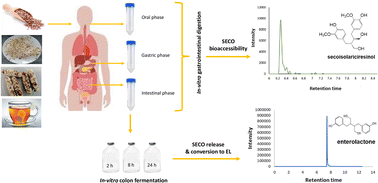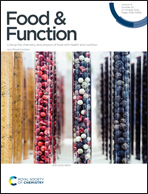In vitro gastrointestinal bioaccessibility and colonic fermentation of lignans from fresh, fermented, and germinated flaxseed†
Abstract
This research assessed the influence of fermentation and germination as well as of particle size on lignan bioaccessibility from flaxseed by simulated in vitro gastrointestinal digestion. In vitro simulated colonic fermentation was used to study lignan release and its conversion into enterolignans. In addition, tea was included as a representative sample to investigate the stability of lignans in the gastrointestinal tract. Only secoisolariciresinol (SECO) was detected in flaxseed samples. SECO bioaccessibility in fermented flaxseed was highest among all matrices but limited to ≈1% (P < 0.001). Lignan bioaccessibility was significantly influenced by particle size too (P < 0.001 for both). In the colon, fermented flaxseed produced the highest SECO release among all flaxseed samples (≈65%), and the highest conversion of enterolignan (≈1.0%), whereas the conversion of lignans in tea brew was relatively high (≈15%). Lignan conversion varies greatly among donors due to inter-individual differences in microbiota activity. Food fermentation could be a viable strategy for increasing lignan release and conversion to enterolignan.



 Please wait while we load your content...
Please wait while we load your content...